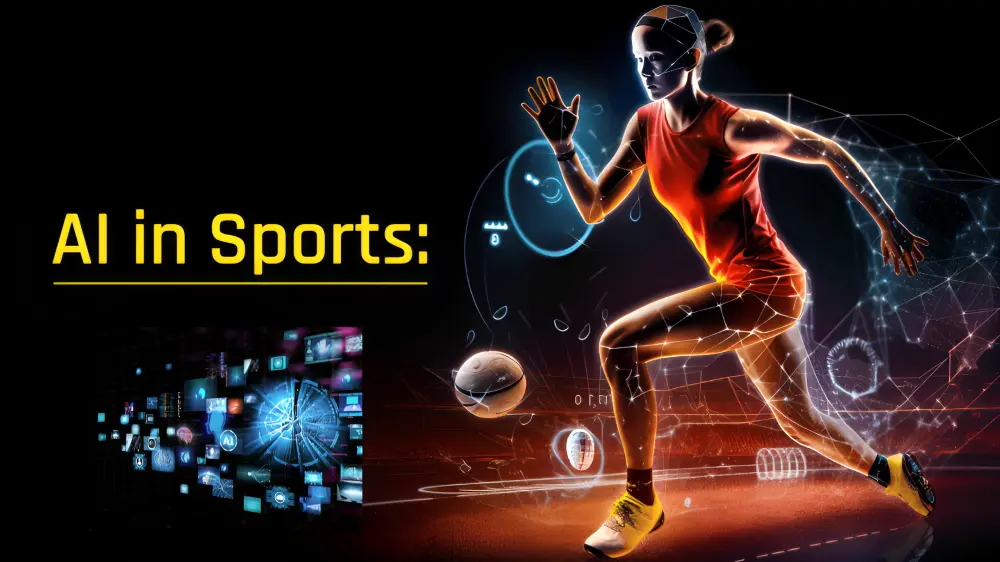PwC noted that artificial intelligence (AI) permeates every facet of sports, including gameplay, competition, and the show and entertainment industries. Additionally, artificial intelligence (AI)-based tools are already being used in almost all major sports, including grassroots sports and non-professional pastimes like baseball, soccer, American football, and cricket. Sports AI integration has the potential to be revolutionary.
However, it can be as difficult to comprehend how AI functions and how it affects sports as it is to interpret a pitcher’s signals from behind the home plate. We must comprehend what AI in Sports entails, just as an athlete must know their sport inside and out to be successful in it. For most people, that’s when things get complicated.
Factors Behind The Adoption of AI In Sports
The ability of AI in sports to process enormous volumes of data quickly and accurately is a major driving force behind this boom; human analysts may find this difficult due to the volume or complexity of the data. Coaches, players, and even fans can now make well-informed decisions based on trustworthy insights from these kinds of analyses. Everything from identifying strengths and weaknesses through sophisticated metrics analysis to forecasting match results using machine learning algorithms is made possible by modern technology.
Benefits of AI in Sports
- Increased revenues
- Superior fan engagement
- More efficient injury prevention,
- Data-driven, bias-free decisions
- More accurate refereeing decisions
- Training and game strategy optimization
- Automation of time-consuming processes
The Future Landscape of AI in Sports
Artificial intelligence is poised to bring about a revolutionary shift in the sports industry. This era is marked by revolutionary developments in AI that have the potential to completely reshape conventional wisdom. All things considered, these developments provide an intriguing look at the future of AI in Sports.
Virtual Reality Training Environments
- Athletes can practice without running the risk of injury from real-world gameplay.
- Data-driven insights assist in highlighting advantages and disadvantages missed by traditional approaches.
- This enables coaches to decide how best to enhance player performance by using precise analytics from every practice.
Immersive Experience
By providing immersive and interactive experiences, artificial intelligence (AI) is transforming sports broadcasting and radically altering how fans interact with sporting events. The ability of AI to provide innovative camera angles and augmented reality (AR) overlays, which improve traditional broadcasts with a depth of coverage previously unattainable, is what is driving this transformation.
AI-enabled cameras record every moment with extraordinary clarity and detail, offering dynamic and distinctive perspectives of the action. AR technology enhances the broadcast by superimposing player biographies, real-time statistics, and captivating visuals, thereby augmenting the viewer’s comprehension and pleasure of the game.
Adding virtual reality (VR) enhances this experience even more. With an unmatched sense of immersion, viewers can virtually enter the sports arena and experience the event from multiple perspectives, including that of the players. Viewers can now engage with the content in new ways, such as choosing camera angles or getting access to in-depth game analytics, thanks to this gamified approach to broadcasting.
In addition, AI-powered real-time analytics and intelligent replay functionalities guarantee that pivotal moments are emphasized and scrutinized, offering discernments into tactical approaches and individual accomplishments. This improves the watching experience and strengthens the bond between the spectator and the sport.
Predictive Analytics for Match Outcomes
Predicting match outcomes is another crucial area in which artificial intelligence (AI) in sports shines, especially for sports bettors who follow professional sports. This is in addition to enhancing player metrics and preventing injuries through intelligent monitoring systems.
Artificial intelligence (AI) is starting to change the game in the sports prediction space by providing insights and foresight that were previously unattainable. AI is being used in this field in several ways, chief among them being the prediction of match results and support for sports betting. Here, AI’s advanced predictive analytics are what makes it useful. To make predictions about sports outcomes, it carefully examines player statistics, team dynamics, historical performance, and a plethora of other pertinent data points.
The Impact of AI in Sports
Sports events are always dynamic settings where decisions made in a split second can change the course of a game; for this reason, real-time information processing tools are extremely important. Beyond using predictive analytics to help referees make accurate calls during games, applications also help athletes avoid injuries by continuously monitoring heart rates and other vital statistics through wearable technology. This helps coaching staff create training plans that are effective and specifically catered to each athlete’s needs while also taking into account their physical condition.
Conclusion
AI is completely changing sports, from gameplay to fan interaction. Through immersive experiences, its integration revolutionizes broadcasting and improves decision-making, injury prevention, and training strategies. AI in sports is expected to become indispensable in the future as predictive analytics continues to gain traction and provide fresh insights.
FAQ’s
Q1. Is artificial intelligence used by FIFA?
Ans. FIFA has introduced semi-automated offside technology (SAOT), which tracks players and the ball using computer vision driven by artificial intelligence. Moreover, the system was in use for the 2022 World Cup.
Q2. When did AI first appear in sports?
Ans. About 20 years ago, sports organizations began actively investigating the possibilities of artificial intelligence (AI), data science, and data analytics; the renowned “Moneyball” case study also served as a catalyst. However, due to the development of machine learning, expanding data access, and rising computing power, AI has played a bigger role in recent years.
Q3. Was AI employed during the Olympics?
Ans. Deloitte emphasized how the widespread use of artificial intelligence (AI) in a range of forms, such as wearable sensors, computer vision-powered cameras, robots, drones, and machine learning-based sports analytics, was a defining feature of the Tokyo 2020 Summer Olympics. The Olympic theme song was even composed using artificial intelligence.





